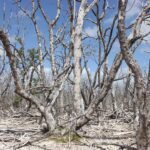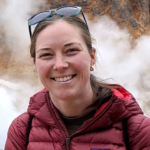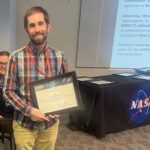ESSIC and partner scientists gathered with sponsors from the National Oceanic and Atmospheric Administration (NOAA) in mid-November, as they exchanged ideas at the 3rd Annual Cooperative Institute for Climate and Satellites Maryland (CICS-MD) Science Meeting.
Throughout the two-day event, scientists filled ESSIC’s conference room to present their latest findings, hoping to both enlighten their peers and pave the way for future collaborations.
The annual meeting originated three years ago by CICS-MD Director and ESSIC Research Professor Dr. Hugo Berbery, serves as a conduit for scientists to learn what their peers are doing.
“Many times, ideas may come up for additional research or additional developments when two people discover that they are doing something that can be complementary,” Berbery said.
This year’s meeting theme entitled, “Satellite Observations for Earth System Monitoring and Prediction,” featured eight sessions with topics addressing climate research, microwave instruments, Earth system monitoring from satellites, and climate science support for policy.
The meeting also included talks from students working within CICS-MD, a component Berbery believes is essential for the future of scientific research, since it establishes early career interactions with both UMD and NOAA scientists.
“They get to work with people at NOAA and people at NOAA get to know them,” Berbery said. “When there might be an opening in the future, these people will be in a good position to apply.”
ESSIC Director Professor Antonio Busalacchi welcomed the attendees Wednesday morning and opened the meeting by introducing the meeting’s goal of collaborative discussion.
“What do we want to aspire to collectively over the next five years?” Busalacchi asked the room full of scientists.
CICS Executive Director Professor Dr. Fernando Miralles-Wilhelm accentuated Busalacchi’s welcome by emphasizing the meeting’s opportunity for researchers to both engage one another and to understand emerging trends and important priorities.
This year’s meeting also presented researchers with an opportunity to express thanks and fond farewells to outgoing Director of Cooperative Research Programs at the NOAA National Environmental Satellite, Data, and Information Service (NESDIS), Dr. Ingrid Guch.
Guch, who delivered the first presentation of the meeting —her last talk as Cooperative Research Director—has been a key figure in the communication between CICS-MD and NOAA. Her presentation discussed the research priorities for NESDIS and the Center for Satellite Applications and Research (STAR) program.
As the presentations concluded Thursday evening, researchers left the annual meeting armed with their peer’s latest results and ideas for future collaborations.





